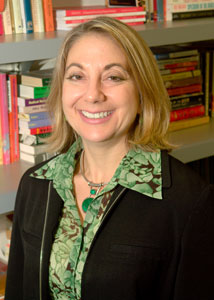  |
| HOME | THIS ISSUE | CALENDAR | GRANTS | BACK ISSUES | < BACK | NEXT > |
New professor specializes in multicultural literature, languageby Cindy Weiss - September 18, 2006 |
||||
| Martha Cutter, who joined the English department this fall as an associate professor, brings to UConn her interest in ethnic and gender issues in language and literature. She has a joint appointment with the Institute for African American Studies, and is also the new editor of MELUS, the journal of the Society for the Study of Multi-Ethnic Literature of the U.S. MELUS has been based at UConn since 2000. The previous editor was Veronica Makowsky, professor of English and women's studies and vice provost for undergraduate education and regional campus administration. "I've always been interested in language - how language creates certain kinds of cultural identities, how it empowers certain groups of people, and how women and ethnic writers intervene in that," says Cutter. Her new book, Lost and Found in Translation: Contemporary Ethnic American Writing and the Politics of Language Diversity (University of North Carolina Press, 2005), explores some of these issues. Ethnic American writers are faced with considerations about what is lost and what is gained in translation, she says. Julia Alvarez's novel, How the Garcia Girls Lost Their Accent, for example, was written in English and eventually translated into Spanish, although the author spent much of her childhood in the Dominican Republic, where her parents came from. Some Mexican-American authors write in English and their works are translated into Spanish for Latinos living in the U.S. or in other countries. Others switch back and forth between languages, Cutter notes. Multilingualism is considered an advantage in Europe, and it has been used to advantage by some in the U.S. "Some of our greatest leaders have been empowered by their use of many languages," she says. Martin Luther King Jr., she notes, could call on standard English, black vernacular, and 'Biblical' speech. At the same time, bilingual education and concerns about the U.S. official language are political controversies. "The U.S. has always had a fear of multilingualism," she says. While some immigrant groups have kept their mother tongue in addition to English, most give it up within two or three generations, she says. "How they could learn English and maintain their mother tongue often is not even addressed." Bilingual programs often emphasize immersion, and may alienate immigrant children from parents who are advised not to speak the native tongue at home, she adds. A better way to teach bilingually would be to maintain the ethnic tongue and develop it, so that children learn to read and write in it, too, she says.
With the growing power of China, Taiwan, and Hong Kong, there is an incentive for young Chinese Americans to maintain their language, to prepare for careers in an international economy. Cutter also has written about gender issues, exploring them in her book, Unruly Tongue: Identity and Voice in American Women's Writing, 1850-1930. In the 19th century, when women were advised to be seen and not heard, some popular women authors were empowered by not following that rule, she says. "I was intrigued by this contradiction," Cutter says. Author Charlotte Perkins Gilman, for example, best known for her 1892 story "The Yellow Wall-Paper," likened a woman's taking her husband's name upon marriage to "the tag on the dog." Others, such as Kate Chopin, created alternatives to the language of men, seeking a maternal or musical voice. As the editor of MELUS, Cutter plans to continue its trend toward exploratory and analytical essays about writers, and to make it "a plum for the field" of ethnic and gender literature. Now that the field is well established, she says, she would like to bring scholarship about lesser known writers to its pages. Cutter, who was on the faculty at Kent State University for 11 years before coming to UConn, earned her bachelor's degree from Harvard and her master's and Ph.D. from Brown. As a newly minted Ph.D. in English in 1991, she had a series of one-year visiting appointments - at Swarthmore, the University of Oregon, and, from 1992 to 1993, the University of Connecticut. She has taught at both private and public universities, but says she prefers large public institutions with their broad range of students, many of them the first generation in their family to go to college. "They don't take their education for granted," she says. "You're actually serving a group of students who 40 or 50 years ago might not have been able to go to college." This fall she is teaching a survey of contemporary American literature for sophomores and juniors, and in the spring she will teach a course that pairs works by Toni Morrison and Spike Lee. "Both of them have unique perspectives on American society," she says, "looking at subtleties of behavior and meaning that often are not articulated." |
| ADVANCE HOME UCONN HOME |

